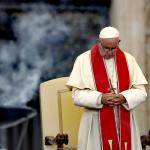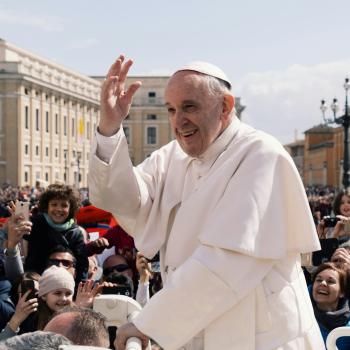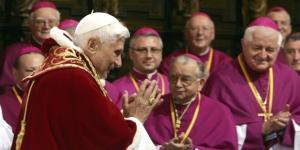
“When you think of your death, seek not your rest in the hardened ground. But do so in the breast of men where heartbeats can be found.” – Jason Versey, A Walk with Prudence
Pope Emeritus Benedict XVI became the head of the Catholic Church at a time when grievances of sexual abuse by the clergy were threatening the Church`s global moral standing. The abuse indignities hounded most of the late Pope`s papacy but he received credit for starting the defrocking process of priests found guilty of sexual offenses. He also ordered an investigation into the abuse scandals in Ireland, which led to several bishops resigning. He disciplined one of the Church`s most infamous offenders and founder of the Legionaries of Christ and the Regnum Christi movement, the late Father Marcial Maciel.
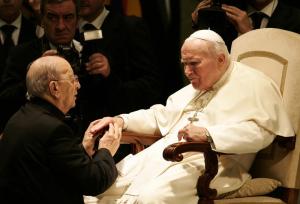
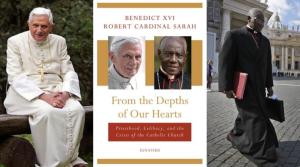
Seven years after his resignation, Pope Emeritus Benedict XVI co-authored a book, titled From the Depths of Our Hearts with Cardinal Robert Sarah, the Vatican’s then Prefect of the Congregation for Divine Worship and the Discipline of the Sacraments. Upon publication, the book stirred up mix emotions, particularly about the Catholic priesthood. The two authors revealed that the priesthood was going through a dark time as the constant questioning of consecrated celibacy confused many priests and tempted them to think about giving up and ending everything.
Re-centering the Ministerial Priesthood
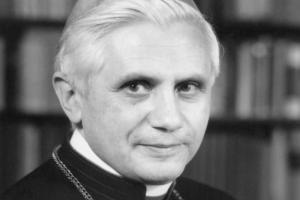
As a priest, archbishop, and Pope, late Pope Emeritus Benedict XVI upheld the definition of the priesthood that each believer receives at baptism – it is well written in Lumen Gentium. The priesthood is called “common priesthood” in the Catechism of the Catholic Church. Throughout his ministry, the late Pontiff paid particular attention to the ministerial priesthood, which includes the order of priests and bishops. Pope Emeritus Benedict XVI held on to the Roman Catholic tradition that explains that the bishops embody the wholeness of the ministerial priesthood as beacons of Catholic concord.
He unfailingly gave attention to priests who are not bishops because he believed that the revitalization of the Roman Catholic Church must be channeled through re-focusing on the Christology of the pastoral care. The late Pontiff believed that Christ is the foundation of the ministerial priesthood. Pope Emeritus Benedict held the ministerial priesthood in high regard – this high esteem came from what he inherited from the traditions of the Catholic Church but also came from his personal experience. The late Pontiff spoke of his own ordination as being the summit of his life. He profoundly appreciated how his Catholic fraternity supported him and his confreres with fervor and happiness as they dedicated themselves fully to Christ. With special fondness, Pope Emeritus Benedict kept the memory of the priest who mentored him very close to his heart; the priest (mentor) died while anointing a dying parishioner. The late Pontiff was very optimistic about the ministerial priesthood; through his personal experience as a priest, he was aware of the effectiveness of the ministry in the life of the Catholic Church.
His Vision
Pope Emeritus Benedict (Joseph Ratzinger) was convinced that the revitalization of the priesthood was not a simple matter of addressing certain clerical issues, because these issues were indications of a deep rooted and disturbing reality. Thus, according to the late Pontiff, calling priests to be deeply devoted to Christ will protect the world and Catholic Church from clerical abuse scandals. Pope Emeritus Benedict believed that if priests were to re-center their lives on Jesus Christ their priesthood would be fruitful.
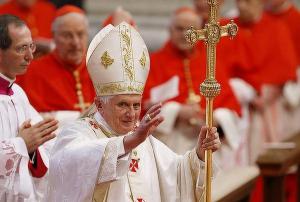
Pope Emeritus Benedict`s vision about the Christological of the priesthood emanated from his personal dedication to Christ. Despite his pontificate being a very busy period in his life, the late Pontiff showed his utmost ambition for the Church by dedicating time to penning a three-volume work of Jesus of Nazareth. By just reading a single volume, one can comprehend the depth of Benedict`s devotion. When he addressed the clergy of Rome in 2005, he said, “Dear friends, this is also the true nature of our priesthood. In fact, all that constitutes our priestly ministry cannot be the product of our personal abilities. This is true for the administration of the Sacraments, but it is also true for the service of the Word: we are not sent to proclaim ourselves or our personal opinions, but the mystery of Christ and, in him, the measure of true humanism. We are not charged to utter many words, but to echo and bear the message of a single “Word”, the Word of God made flesh for our salvation. Consequently, these words of Jesus also apply to us: “My doctrine is not my own; it comes from him who sent me” (Jn 7: 16)”.
In his encyclical in which the late Pontiff proclaimed a year for priests, he explicitly said that the year was inaugurated “to deepen the commitment of all priests to interior renewal for the sake of a stronger and more incisive witness to the Gospel in today’s world.” Pope Emeritus Benedict emphasized that a friendship with God should be each priest`s fortress for his ministerial priesthood.
The priest`s responsibility of spreading the Gospel worldwide does not lift him up, rather it should bring him to his knees in prayer. The priest is one who lifts the host (Eucharist), thus the late Pontiff carefully distinguished the office from the person. To talk about late Pope Emeritus Benedict XVI and the ministerial priesthood is to talk about him urging priests to find their way back to Jesus Christ who is the strength and foundation of the priestly ministry.
According to Pope Emeritus Benedict, the solution to the challenge of abuse scandals, global decline of vocations to the ministerial priesthood, and other possible problems that could befall the priesthood is for priests to return to Christ and re-center their lives and their vocations around Him. The late Pontiff once said, “God makes use of us poor men in order to be, through us, present to all men and women, and to act on their behalf. This audacity of God who entrusts himself to human beings – who, conscious of our weaknesses, nonetheless considers men capable of acting and being present in his stead – this audacity of God is the true grandeur concealed in the word “priesthood””.



